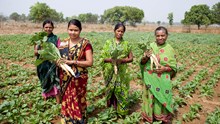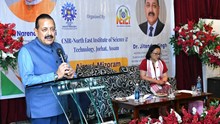
India has about 1.1 million working horses, donkeys and mules. Women rely heavily on these animals to support them with physically demanding and time-consuming tasks such as fetching water and food, or agricultural work.
Women from equine owning communities have produced almost 3000 cotton face masks after the Indian government made masks mandatory for people across populous areas including Delhi and Mumbai. Nearly 3000 face masks have been made already, with more than 2000 going to brick kiln workers, who resumed work this week.
Brooke’s Women Equine Welfare Groups aim to empower women and provide them with a support network.
Women from 19 Women Equine Welfare Groups, set up by the working horse and donkey charity Brooke, were trained in the skill of making cloth face masks thanks to video calls from Brooke and a manual released by the Government of India on March 30.
Initially, women took on the project voluntarily to help their local communities. But the initiative was given a further boost on April 4, when the government directed the State Rural Livelihoods Mission (SRLM) to involve Self Help Groups (SHG) in the production of masks.
The masks have been produced by women across Ahmednagar, Fatehpur and Uttar Pradesh. Of these, 2060 masks have been distributed free to brick kiln workers, who have been given the green light to resume work in rural areas this week as much of the country remains in lockdown. The remaining masks have been given to villages for free or sold to medical stores and markets, with all money going to the women who made them.
Brooke is urging supporters in the UK to donate to its Covid-19 emergency appeal to help people and their animals at this time of crisis.
Working horses, donkeys and mules are essential to the survival of these communities, as they provide vital medical transport and access to food and water.















